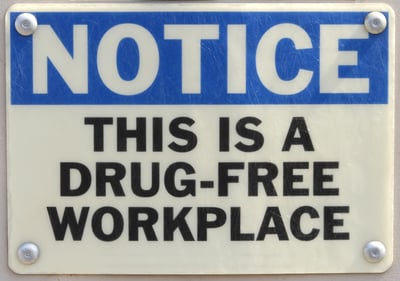How Employers Can Deal With this Hazy Issue
Traditionally there was no question about the status of cannabis in the workplace. Most companies have policies forbidding the use of illegal drugs, but the increasing legalization of marijuana has complicated a once black and white issue. More states have legalized the medical (and sometimes recreational) use of marijuana. A majority of Americans support this trend, according to the Pew Research Center. How can an employer respect the law while maintaining a safe and productive work environment?
Employer Responsibility
Employers must provide employees with safe environments. An employer's right to create zero-tolerance drug policies is generally supported by the courts, but there are grey areas. As Entrepreneur points out, employers with unclear marijuana policies could face discrimination lawsuits in some cases.
Different types of businesses experience different challenges. Companies operating across state lines must accommodate varying state-level cannabis regulations. Larger organizations especially are subject to compliance concerns. What is an employer to do?
Handling Marijuana in the Workplace
1. Respect Employee Inquiries. Employees may ask about marijuana policies. The Balance notes that responding with politeness and basic humanity goes a long way.
2. ADA Accommodation and Drug Testing. So far the courts have not supported the protection of medical marijuana consumption under the Americans with Disabilities Act (ADA), but state laws cause other complications. Consider testing for marijuana differently than for other drugs. Some companies do not test for marijuana at all.
3. Focus on Paid Time. A realistic marijuana policy will focus on managing marijuana use during the workday. Regulating private cannabis consumption on employees' personal time is unenforceable and attempts to do so may raise privacy concerns.
4. Permitting Medical Marijuana. Some companies may have an interest in allowing employees to use medical marijuana for valid health reasons in states which allow for medical use. This will vary depending on the particular organization and employee involved.
5. Safety First. The nature of some businesses leads to additional safety concerns. Employees who operate heavy equipment or who transport passengers should never perform their jobs when subject to the influence of cannabis. This applies to any job where employees are responsible for the lives and/or safety of others. Special legislation covers (and reinforces) such safety measures.
Create a Detailed Marijuana Policy
1. Legal Considerations. Companies located in states where marijuana is illegal can usually ban all workplace use if desired. Where state law permits cannabis, companies must tread with caution. The marijuana issue is complex thanks to a tangle of federal and state laws. Companies must juggle employee privacy with the need to ensure productivity. Consult your attorney when creating or updating your marijuana policy. Make sure the policy protects your employees and your company.
2. Research. Research cannabis to learn how it affects people and work. Become informed on the medical uses and risks of cannabis. Use your findings to draft an effective policy - and to educate your employees. Remember that marijuana laws can change, so stay up-to-date.
Consider using your organization's alcohol policy as a basis for a marijuana policy if your company is headquartered in a state which allows recreational use of marijuana. In such states, an employee may consume cannabis on his or her own time, but employers have the right to sober and accurate employees during work hours.
3. Define Important Terms and Procedures. Eliminate ambiguity and loopholes. State the procedures for and consequences of marijuana use on company time. Take into consideration employee use of marijuana on break periods. Companies with locations in multiple states should make sure their marijuana policy can accommodate different state laws.
4. Spread the Word. Make sure all current employees and new hires read and understand the policy.
5. Enforce. Make sure to enforce the policy consistently and fairly. Popular opinion has favored marijuana in recent decades. The legalization trend will only grow. Employers now and in the future will need to stay current on relevant state and federal laws. Companies with versatile and updated marijuana policies will be best prepared (and protected) for the future.
Platinum Group is a full service human capital management (HCM) resource that allows businesses to manage their payroll, benefits compliance, track time and attendance and other various human resources functions in a way that maximizes efficiency and eliminates redundancies with the platform, iSolved. For more information about Platinum Group or to schedule a demo of iSolved please visit our website.
Platinum Group is headquartered in Asheville, NC with locations in Charlotte, NC; Greensboro, NC; and Durham, NC.

























